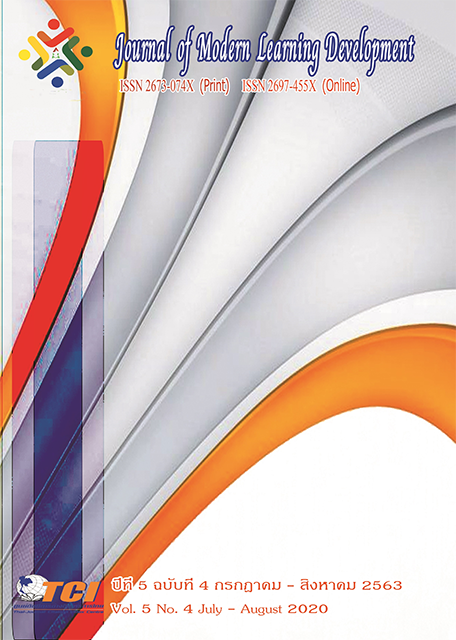PLC : Professional Learning Community for Sustainable Community Enterprise Development
Main Article Content
Abstract
The purpose of this academic paper is to study the PLC process for professional learning communities. In order to develop a sustainable community enterprise, it is found that the development of the community enterprise process must take into account the 3 levels of community enterprise, which are basic level, development level and progressive level. Born from families, communities to exports, by developing various products to have quality and needs. By using 3 PLC process principles, namely, professionals, learners and communities into processes In the development of community enterprises The process is as follows, starting from setting goals, exchanging with others. To determine the method of action Cooperative planning Study and use items to plan for success Lead to the practice for concrete development by inviting others to participate in various activities Of small-scale community enterprise, namely the family, and gradually expanding to the community level By the cooperation and cooperation of the people in the community In which all benefits occur in the community And lead to the expansion of the network into medium-sized enterprises And the next large.
Article Details
References
จินตนา กาญจนวิสุทธ์. (2558). เส้นทางวิสาหกิจชุมชน เพื่อการพัฒนาอาชีพและการพึ่งพาตนเอง. กรุงเทพมหานคร: สำนักพิมพ์มหาวิทยาลัยเกษตรศาสตร์.
ณรงค์ เพ็ชรประเสริฐ และพิทยา ว่องกุ. (2548). การฝึกอบรมทีมวิทยากรหลักในการถ่ายทอดความรู้ เรื่อง วิสาหกิจชุมชน. กรุงเทพมหานคร: โรงพิมพ์แห่งจุฬาลงกรณ์มหาวิทยาลัย.
ธงพล พรหมสาขา ณ สกลนคร. (2556). การจัดการและการพัฒนาวิสาหกิจชุมชน. สงขลา: สถาบันสันติศึกษา มหาวิทยาลัยสงขลานครินทร์.
เรวดี ชัยเชาวรัตน์. (2558). วิถีสร้างครูสู่ศิษย์ : ชุมชนการเรียนรู้ทางวิชาชีพ : เอกสารประมวลแนวคิดและแนวทางพัฒนาวิชาชีพครูสำหรับคณะทำงานโครงการพัฒนาระบบกลไกและแนวทางการหนุนเสริมชุมชนการเรียนรู้ทางวิชาชีพ เพื่อพัฒนาผู้เรียน. กรุงเทพมหานคร : สำนักงานส่งเสริมสังคมแห่งการเรียนรู้และ คุณภาพเยาวชน.
สำนักนโยบายและแผน กระทรวงมหาดไทย. (2559). แผนยุทธศาสตร์กระทรวงมหาดไทย พ.ศ. 2556-2561. ออนไลน์. สืบค้นเมื่อ23 มิถุนายน 2563. แหล่งที่มา : https://www.google.co.th/webhp? Sourceid=chromeinstant &ion=1&espv=2&ie=UTF-8#q
สำนักพัฒนาครูและบุคลากรการศึกษาขั้นพื้นฐาน สำนักงานคณะกรรมการการศึกษาขั้นพื้นฐาน (2563). คู่มือการอบรมคณะกรรมการขับเคลื่อนกระบวนการ PLC (Professional Learning Community) “ชุมชนการเรียนรู้ทางวิชาชีพ” สู่สถานศึกษา ระดับสำนักงานเขตพื้นที่การศึกษา. กรุงเทพมหานคร : กระทรวงศึกษาธิการ.
สุวิทย์ วงศ์เหรียญไทย. (2554). บทบาทขององค์การบริหารส่วนตำบลมหาโพธิต่อการส่งเสริมวิสาหกิจชุมชน : กรณีศึกษาสหกรณ์เครดิตยูเนี่ยนชุมชนมหาโพธิ จำกัดอำเภอเก้าเลี้ยว จังหวัดนครสวรรค์. วิทยานิพนธ์พุทธศาสตรมหาบัณฑิต สาขาวิชารัฐประศาสนศาสตร์. บัณฑิตวิทยาลัย: มหาวิทยาลัยมหาจุฬาลงกรณราชวิทยาลัย.
Senge, Peter M. and others. (1999). The dance of change: the challenges of sustaining momentum in learning organizations. New York: London Currency/Doubleday; Nicholas Breale.
Thompson, S. et al. (2004). Professional learning communities, leadership and student learning. Research in Middle Level Education, 28 (1),1-15.


